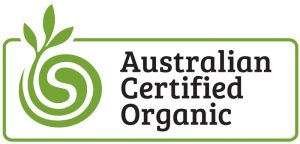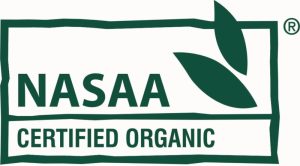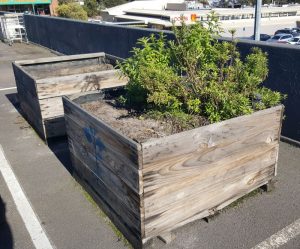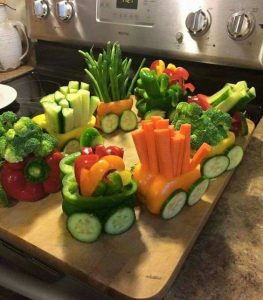Mac’s tip of the week
“It seems hard to believe that we have already reached the winter solstice and that the days will soon be feeling longer as we head out of winter towards spring. So, with that in mind, have you done your winter pruning yet? Some people like to wait until late winter (mid-July) but, if you have the time and inclination, now is as good a time as any, particularly if all your leaves have fallen. It’s also a great time to clean and sharpen your secateurs and pruners. A decent sharpening stone and some vegetable oil or lanoline spray is all you need for this. In fact I know someone with dirty hands who just spits on his sharpening stone! Another common practice is to sterilise your pruners when moving from one tree to another to minimise transfer of diseases. This is done by dipping them in bleach or tea tree solutions or by spraying with metho and wiping clean before moving on. Some garden centres (and most mower shops) will also sell ‘all-in-one’ cleaning/lubricating/disinfection sprays for your pruning tools. Until next time, remember: dirty hands are good hands.”
Editor’s note: here is a very watchable video about how to remove rust from your tools.
 Organic certification – everything you want to know but are afraid to ask
Organic certification – everything you want to know but are afraid to ask
Stimulated by the recent opening of Organic Fix, I decided to write an article about the relationship between local food and Certified Organic food. But I quickly discovered that I first needed to discuss some key points about organic certification. So, the article has become a two-parter: organic certification this week and the relationship between local food and Certified Organic food next week.
 The organic certification article is 1,500 words long and it would be good for you to read the lot. But, if not, here are some of the key points:
The organic certification article is 1,500 words long and it would be good for you to read the lot. But, if not, here are some of the key points:
- A food product is Certified Organic if and only if it has been certified as such by one of the 7 certifying bodies in Australia. These bodies are all effectively certifying to the same Government-driven set of standards.
- You may be surprised by how comprehensive (and readable) the standards are. For example, for livestock, they have sections on breeding, nutrition, medications, welfare, housing and handling.
- In some countries (e.g. throughout the European Union), the word ‘organic’, when applied to food labelling, has a legal definition. In Australia, however, there is no such legal restriction and anyone can effectively label their food products ‘organic’.
- The Oxford English dictionary’s first definition of the word ‘organic’ is “relating to or derived from living matter“. Its second definition is “(of food or farming methods) produced or involving production without the use of chemical fertilisers, pesticides, or other artificial chemicals“. In terms of food, these two definitions effectively represent the opposite ends of a spectrum. According to the first definition, all food is ‘organic’. According to the second definition, there is a subset of food which is ‘organic’, namely food grown without chemical fertilisers, pesticides, etc, as opposed to food which is ‘conventionally grown’.
- In this context, the word ‘organic’, when applied to food, provides no guarantees of anything meaningful, let alone anything legal. And, that, of course, is why certification is important: certification is a guarantee and the term ‘Certified Organic’ has a single, clear and well-defined meaning.
- If we knew how a particular farmer grew their fruit and veggies, we might be comfortable eating their produce regardless of their certification. Ditto if we knew what ingredients a particular maker used. Putting this another way, ‘trust’ can be an alternative to ‘certification’.
Read the full article. Any comments would be appreciated – just email me.
Local food producer news
Kings of Kangaroo Ground have just won two gold medals at the The Cairns Show Wine Awards for their medium boded reds: 2015 ‘Avondale’ Shiraz and 2015 Shiraz Cabernet.
Want some free soil/compost?
 There are still two wicking beds at Eltham Farmers’ Market that have to be dismantled. So, good homes are being sought for their various components: the soil/compost/manure mix, the pond liner, the scoria, etc. Pick up in situ. If interested, contact Bev Robertson by phone (9439 1421) or email to arrange the logistics.
There are still two wicking beds at Eltham Farmers’ Market that have to be dismantled. So, good homes are being sought for their various components: the soil/compost/manure mix, the pond liner, the scoria, etc. Pick up in situ. If interested, contact Bev Robertson by phone (9439 1421) or email to arrange the logistics.
Want to learn about food as medicine?
The Department of Nutrition and Dietetics at Monash University have put together a free, online, 3 week course on food as medicine starting 17th July. Paraphrasing their material: “At a time when food and nutrition information is at an all-time high, there is a lot of confusion and misinformation out there about food-based recommendations for wellness. Explore food’s current role in health and disease; expand your understanding of nutrition science and how it guides you on what and how much to eat for health; learn how to apply evidenced-based nutrition knowledge to guide what food can be used as medicine for you and your family. This course will have broad general interest appeal to everyone interested in food, nutrition and health and does not require previous knowledge or experience in science or health studies.” They also have a YouTube channel with lots of relevant videos. Thanks for the heads-up, Dana Thomson!
Donate to help people make safer garden product choices
Sustainable Gardening Australia (SGA) has launched a crowdfunding campaign on Chuffed.org (campaign ends on 24th July) to help fund the development and maintenance of a web-based database that scores 1,000+ chemicals against 11 criteria relating to their human and environmental impacts. Each product will be rated from 1 to 6 stars and show levels of safety for humans, bees & other insects, fish & birds, persistence in soils, and likelihood of polluting waterways. In addition, it will suggest chemical-free alternatives to gardening problems. The database will help home and professional gardeners make informed choices on how to reduce the use of chemicals that may have negative effects on human health and environmental impacts. Donate.
Picture of the week
 Every newsletter has to have at least one good picture, so here is this week’s: veggie train.
Every newsletter has to have at least one good picture, so here is this week’s: veggie train.
Joke of the week
Meg Montague recently spent a weekend away with friends brainstorming herb and vegetable jokes(!). You’ll see the fruits of their labours over the coming weeks. Thanks, Meg!
Why shouldn’t you invite herbs to dinner? No one has got thyme for dills.
And, as a bonus: Why don’t you need to hurry when gathering herbs in the garden? Because you’ve got plenty of thyme.
Read all of this year’s jokes.
New events
Composting and improving soils (two-session)
What: Learn how you can produce rich, fertile soils perfect for growing delicious fruit and vegetables. Presenters Jessica Peeler and Jie Fan will share their knowledge. Gardeners of all abilities and levels of experience welcome.
When: Saturday, 24th June and Saturday, 1st July, both 10am-12.30pm.
Where: Brunswick Neighbourhood House.
Cost: $35.
Bookings: by phone (9386 9418) or email.
Further information: LFC calendar entry.
Indigenous food
What: Join Uncle Ian Hunter as he shares his knowledge of indigenous food found in the City of Whittlesea. Learn how to make soap from native plants or try eating an ant.
When: Friday, 7th July, midday-1pm.
Where: Lalor Library.
Cost: free.
Bookings: just turn up.
Further information: LFC calendar entry.
Right to Food Coalition – ‘In Defense of Food’ film night
What: Watch a screening of Micheal Pollan’s In Defense of Food film. After the film, there will be a Q&A with local food gurus, including Dr Seona Candy (Foodprint Melbourne), plus raffle prizes.
When: Thursday, 20th July, 6.30-8.30pm.
Where: Cinema Nova, Carlton.
Cost: $25 (all proceeds going towards advocacy and awareness-raising efforts by the volunteer not-for-profit organisation the Right to Food Coalition).
Bookings: Eventbrite.
Further information: LFC calendar entry.
Winter vegetarian basics
What: Presenter: Julie French. This cooking class is for those people who, for whatever reason, would like to introduce more meat free meals into their diet. Go and find out how to create balanced and delicious vegetarian meals that make the most of seasonal produce, with a focus on winter ingredients. The workshop will be a mix of demonstration and participation, and will include a shared lunch (from the food you prepare together). Notes and recipes will be provided.
When: Saturday, 22nd July, 9.30am-1.30pm.
Where: Montmorency Primary School.
Cost: $85 (includes lunch).
Further information: LFC calendar entry.
Sugar and your health
What: Health Coaches Callie (a registered nurse) and Elise will discuss the different types of sugar, what to watch out for, and tips on how to reduce your sugar intake. The presentation will be followed by a screening of That Sugar Film, where Damon Gameau embarks on an experiment to document the effects of a high sugar diet on a healthy body.
When: Monday, 24th July, 1-2pm.
Where: Mill Park Library.
Cost: free.
Bookings: their website.
Further information: LFC calendar entry.
Growing organic veggies for Spring and Summer
What: Growing your own veggies is rewarding in so many ways. This workshop will teach you what is needed for growing your own veggies at home. Learn organic pest control methods, how to grow from seeds, companion planting and what is in season for Spring and Summer planting.
When: Tuesday, 1st August, 7-9.30pm.
Where: North Ringwood Community House.
Cost: $25.
Bookings: their website.
Further information: LFC calendar entry.
The world of truffles
What: Presenter Noel Fitzpatrick. The seminar will cover all aspects of truffle growing, including choosing the right site, soil type, host tree and truffle life-cycle. There will also be a discussion and demonstration of truffle cooking techniques with truffle devotee Susan Burns. The seminar will concludes with afternoon tea and truffle tasting. You may also purchase fresh truffles at a discount on the day.
When: Saturday, 5th August, 3-6pm.
Where: Burnley Campus, University of Melbourne.
Cost: $80.
Bookings: by phone (9035 6815) or email.
Further information: LFC calendar entry.
How to make sense of food labels
What: Tour a supermarket and learn how to accurately read and understand food labels and choose healthy foods that are suitable for the whole family. You will also receive a show bag with information sheets and a healthy shopping guide booklet. The tours are led by healthAbility’s qualified dietitian and open to anyone interested in healthy eating.
When: Monday, 7th August, 9.30-11am.
Where: Eltham.
Cost: $15 (includes a healthy shopping guide booklet).
Bookings: healthAbility by phone (9430 9100).
Further information: LFC calender entry.
Launch of the Burnley Fruit Squad
What: The Burnley Fruit Squad will be launched on 13th August along with a workshop on fruit trees and harvesting. The squad will be a group of volunteers who harvest excess fruit from households in Burnley and share with the community. The project is supported by the Richmond Community Learning Centre, Richmond Community Garden Group and the City of Yarra. Its aims are: to reduce food wastage in Burnley; to enable skill sharing between householders and volunteers; and to foster social connections in the community. In the meantime, if you have vines or fruit trees at your home that may need harvesting, or if you would like to learn new skills and help harvest excess fruit, please sign up.
When: Sunday, 13th August, 10am-midday.
Where: Richmond.
Cost: free.
Bookings: rsvp by email.
Further information: LFC calender entry.
Food, family, culture – The Community Grocer
What: The Community Grocer Fitzroy launched in March 2017, joining existing enterprises in Carlton, Fawkner and Mernda. With over 23,000 customers to date, The Community Grocer, aims to improve access for people living on a low-income to fresh, affordable food, running weekly fruit and vegetable markets where everyone is welcome. Laura will introduce The Community Grocer from its background and operations to goals and plans for the future. With food at the very heart of all cultures and taking a central role in shaping and maintaining our cultural identities, she will discuss the important political distinction between ‘food security’ and ‘food sovereignty’ and how it relates to preserving culture through food. Laura will share recipes from customers and serve up a popular Sudanese dish of peanut salad. Bookings essential.
When: Wednesday, 16th August, 6.30-7.30pm.
Where: Fitzroy Library.
Cost: free.
Bookings: Eventbrite.
Further information: LFC calender entry.
Indian cooking – Punjabi (two sessions)
What: Tutor Taariq Hassan. Learn how to cook a healthy North West Indian vegetarian meal from scratch using authentic ingredients.
When: Monday, 21st August and Monday, 28st August, both 6.30-8.30pm.
Where: Hurstbridge Hub.
Cost: $92.
Bookings: their website.
Further information: LFC calender entry.
Summary of upcoming events
Over the next week
- Fruit tree pruning: Wednesday, 21st June, 10am-2pm.
- Gluten-free cooking demonstration: Thursday, 22nd June at 7pm.
- Beekeeping workshop: Saturday, 24th June, 9-11am.
- Sourdough bread making workshop: Saturday, 24th June, 10am-1pm.
- Winter solstice celebration – make your own seed bombs: Saturday, 24th June, 11am-midday.
- Food, family and culture for refugee week – SisterWorks: Saturday, 24th June, 12.30-2pm.
- Set up and maintain a worm farm: Saturday, 24th June, 3-4pm.
- Composting and improving soils (two-session): Saturday, 24th June and Saturday, 1st July, both 10am-12.30pm.
- Mooroolbark Growers & Weeders present – “home bakers’ Q&A”: Tuesday, 27th June, 2-3pm.
- Garlic masterclass: Wednesday, 28th June, 7-9pm.
Over the next month
- Save energy, save money, make friends workshop: Thursday, 29th June, 7-9pm.
- Herbal teas: Saturday, 1st July, 9.30am-12.30pm.
- Winter fruit tree care and grafting with Craig Castree: Saturday, 1st July, 10.15am-12.15pm.
- Composting for nutrient rich soil: Saturday, 1st July, 11am-midday.
- Artisan pasta – ravioli and cannelloni: Sunday, 2nd July, 10am-2pm.
- The Rogue Ginger – zero waste living: Sunday, 2nd July, 1-2pm.
- Pete the Permie on berry fruits: Tuesday, 4th July, 7.15-9.15pm.
- Backyard chooks for beginners: Thursday, 6th July, 10am-midday.
- Indigenous food: Friday, 7th July, midday-1pm.
- DIY grafting: Saturday, 8th July, 9.30am-12.30pm.
- Permablitz 199 (Montmorency): Saturday, 8th July, 9.30am-4.30pm.
- Food know how sustainability sessions: Tuesday, 11th July, 11am-midday.
- Chocolate brownie jar workshop: Wednesday, 12th July, 10.30-11.30am./li>
- Love food, hate waste cooking demo with lunch: Friday, 14th July, midday-2pm.
- Growing fruit and veggies in small spaces: Saturday, 15th July, 9.30am-12.30pm.
- Towards a zero waste lifestyle: Saturday, 15th July, 2.30-4.30pm.
- Right to Food Coalition – ‘In Defense of Food’ film night: Thursday, 20th July, 6.30-8.30pm.
- The age old art of preserving – bottling, jams, pickles & chutneys: Friday, 21st July, 10am-1.15pm.
- Winter vegetarian basics: Saturday, 22nd July, 9.30am-1.30pm.
- Biochar gardening with Ian Culbard and Adrian Whitehead: Saturday, 22nd July, 2-4pm.
- Introduction to permaculture (two day): Saturday, 22nd July and Saturday, 29th July, both 10am-4pm.
- Winter fruit tree pruning workshop: Sunday, 23rd July, 9am-midday.
- Fruit tree pruning and maintenance: Sunday, 23rd July, 10am-3pm.
View the complete calendar of upcoming events.
Read some help on how to view the calendar selectively. For example, search for events in a given suburb or set of suburbs. Or search for event of a given type, such as markets).
